The author with a portrait of Kazakh President Nursultan Nazarbayev
By Jonathon Dreeze
Despite having been in Kazakhstan twice before, I had never visited the country’s capital, Astana. My dissertation is on Soviet propaganda in Central Asia, specifically Kazakhstan and Uzbekistan, during the Stalinist period, 1929-1953. Currently I am in Kazakhstan on a Fulbright grant to conduct dissertation research in Almaty. Almaty, the largest city in Kazakhstan was the capital of the Kazakh Soviet Socialist Republic, and the capital of independent Kazakhstan until 1997, when the Kazakh state decided to move the capital to Astana (which, imaginatively enough, means “capital” in Kazakh). This time around I was fortunate to spend my first few days in Kazakhstan in the capital on account of a mandatory orientation at the American embassy.
I arrived in Astana around 6 in the morning and as I was being driven to my hotel I was struck by how expansive and new the city looked. It looks nothing like Almaty. In Almaty the roads are narrow and crowded, lined by rough looking Soviet-era apartment blocks, with the Tien Shan mountains constantly lurking in the background. By contrast, in Astana the roads are wide and lined with modern-looking apartment buildings. The city’s expansive feel is further emphasized by the nearby vastness of the steppe the surrounds the entire area. At times the expansive nature of Astana can make this urban center of over 800,000 feel almost like a ghost town. At 6 in the morning the streets and sidewalks are almost completely empty. While this could be expected with it being rather early in the morning, the emptiness of the city reminded of images from North Korea’s showcase capital, Pyongyang, showing empty streets, devoid of both motor and foot traffic.
Photos of Astana by the Author
After a few days of getting settled in Almaty I ventured to the archives to begin my research. Most of the sources I require are held at the Archive of the President of the Republic of Kazakhstan (the Presidential Archive) and at the Central State Archive of the Republic of Kazakhstan (the Central Archive). The Presidential Archive is the former archive of the Kazakh Communist Party and the Central Archive contains the files of the government of the Kazakh Soviet Socialist Republic. The archives are pleasant places to work, with little chance of invoking the wrath of a cranky reading room employee or an irate babushka, two issues I have had to deal with while working in the Russian archives.
However, there is always the chance that you will be pulled aside in the archive and asked to say a few words with the archive’s director or asked to submit a (handwritten) summary of your research. Last summer at the Presidential Archive I was asked by a reading room employee if I was available to meet with the archive’s director at on a certain day and time. I said that I was available, assuming that it would be a one on one meeting with the director and I would have to explain my dissertation project to him. Instead I, along with several other graduate students had to present an outline of our dissertation or research projects in front of a meeting of nearly the entire archival staff, in Russian of course. While this in and of itself was not terribly difficult, I was then asked a variety of questions like, “How did archives in the United States work?” “What are some of the techniques or technologies that they use?” “What do you think of the way our archive is run?” “What are some ways that we could improve things?” “Tell us about the education system in the United States?” These were all questions that I would have difficulty answering in English, let alone in Russian. It also felt that telling the director of the archives, in front of all of his employees, about certain problems or complaints was a trap of some kind. I said that I could not think of any problems, although another American graduate student present at the meeting tactfully noted that Wi-Fi in the reading room would be a great improvement.
I survived the meeting with only a bruised ego after one archival employee noted that my Russian was not quite up to snuff. This meeting and its somewhat misleading pretexts are an example of the random and unforeseen events that one seems to encounter all too often while doing research in post-Soviet archives. In fact, I would say that being prepared for the unknown is a key skill to have when doing archival research. Often one does not know when an archive will be closed for a holiday or cleaning day. Since arriving in Kazakhstan I have been asked to leave the archive immediately because there was a meeting that was going on that I was not told about. Last year I found out the embarrassing way that the reading room at the Presidential Archive is closed on Fridays, even though it was not clearly stated or posted anywhere. Just last week I was told by a fellow researcher in the reading room that the archive was going to be closed on the following Monday for a holiday. None of the archival staff mentioned this to me.
Thus, returning to Kazakhstan has meant that I have to prepare myself for the unexpected. I am still working out why it is that the unexpected seems to happen more when I travel abroad. I do not expect the answer to come easy.
Jonathon Dreeze graduated from Miami in 2011 with a degree in History and REEES. His undergraduate honors thesis was entitled “Happy Birthday, Comrade Stalin! Stalin’s 70th Birthday Party and the Cult of Personality.” He is currently a Ph.D. student in History at The Ohio State University and is spending this academic year in Kazakhstan and Russia researching his dissertation on Stalinist propaganda in Central Asia. He received a Fulbright dissertation grant to support this research.

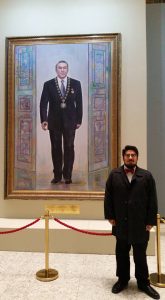
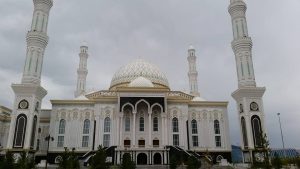
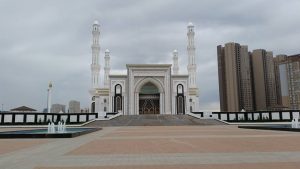
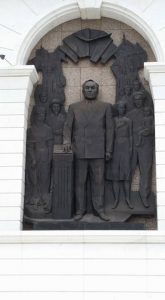
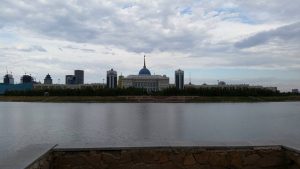
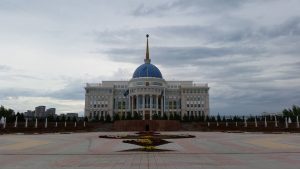
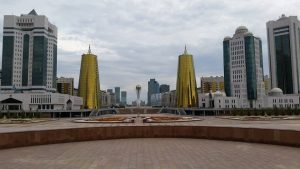
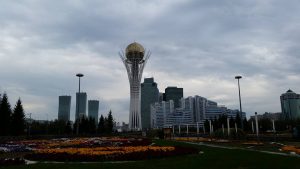
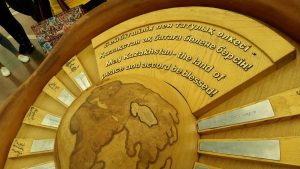
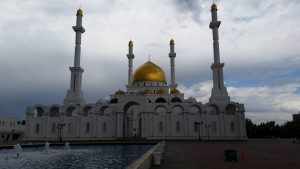
1 Response to Returning to Kazakhstan